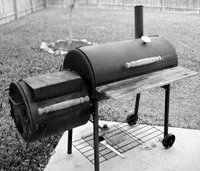Learn about and discuss bbq, sauces, books, marinades, bbq contests, recipes, rubs, spices, seasonings, bbq equipment, bbq pictures, trailers, read the blog and view my website.
Friday, March 31, 2006
Brining BBQ Meat, Day 8 Better Barbecue
In this article I am going to focus on brining. Morton Salt's web site offers products and tips for correct brining techniques for curing all type of food including meat, beef, poultry, fish, and game. However, in this article we're not talking about curing ham, sausage, or bacon. This article is all about using brines to make better bbq. I usually use plain old table salt.
Chicken lends itself nicely to salt water brining.
Some of my favorite brining recipes are for chicken from BBQ Porch).
Here's another chicken brine recipe courtesy of 3Men.com
And still another as published in Fine Cooking magazine.
I like to bbq dark meat like drumsticks and thighs; a brine adds a "deeper" flavor to the meat. Anyone can cook chicken and slap a bunch of sauce on it and call it bbq, but a brine adds an element of flavor that is hard to explain until you experience it.
I've found the less is more with brines. There is a tendancy for brines to become too salty if the meat is left in the solution too long.
Brines are simple to make and simple to use. They are one of the most powerful techniques you can use to add full-flavor to your bbq. Don't over do it. Begin by following the recipe exactly several times before attempting to develop your own signature brining ratios.
Some of the biggest names on the bbq contest circuit have switched from simple marinades for chicken; such as generic homemade Italian dressing, Newman's Own salad dressing, among other brands, to brining for their prize winning entries.
Read the previous article in the series
Thursday, March 30, 2006
Smokin Chicks BBQ
The restaurant is located near Rockbridge High School football field at 4603 John Garry Drive Ste 3 . Columbia Mo 65203. Call them at 573-256-6450.
Here's a copy of the menu featuring such notable items as Smoke BBQ Brisket, Fried Dill Pickle Spears, and the perennial favorite-- pulled pork.
Michigan Barbecue Association
Michigan can support many, many more barbecue contests than it's current rate of travel for KCBS events. At last year's Taste of Grand Rapids event, there were more than 60 teams in attendence. This year there are a total of three Michigan contests on the schedule: Dundee, Grand Rapids and Mears. I'd like to see that number grow steadily over the next few years.
The text of Hayden's letter is included below. If you'd like more information regarding the proposed association, please contact me and I'll put you in contact with Hayden.
MICHIGAN STATE BARBECUE ASSOCIATION
This letter is announcing the intent to form the Michigan State Barbecue Association. We are contacting you because we believe you may be interested in joining this association.
The association will be comprised of folks like yourself who share a common interest in barbecue. It really doesn’t matter whether you are a competition BBQ team, restaurant owner, caterer, event coordinator or backyard BBQ’er, we want you to join us and help promote barbecue in this state and other surrounding Great Lakes states.
At the present time we are sending out this letter and asking that you complete the contact section below and return via mail or email to the address provided. The next step will be to arrange for a brief centrally located first meeting with interested parties. At that time we will begin discussing forming our association and establishing by-laws and mission statement. There will also be a general election for officers to run the association.
If you are interested please complete the contact information below and return to either the email address or street address provided. We will be in touch with you soon.
Thank you for your time and consideration.
Hayden Powers
Having a local association to help promote bbq in the state would be a great asset to contest organizers, the business community, potential corporate sponsors, and bbq contestants collectively.
I urge you to show your support for this proposed new bbq association.
Wednesday, March 29, 2006
Barbecue Disaster to Barbecue Master
To enter the contest and receive personal bbq instruction from Browne, contestants can enter by writing a 100-word essay and submitting it to Cattlemen's via their web site. Grand prize is a trip to the 2007 Memphis in May barbecue contest.
Other Cattlemen's promotions:
Braggin Rights
Hot Off the Grill
Cattlemen's is probably the world's most popular bbq sauce. It's used by amateur backyard cooks, professional contest competitors, and restaurants from coast-to-coast.
I've never used it in a contest, but it's readily available from Sam's Clubs if you want to try it out.
Sunday, March 26, 2006
BBQ Research, Day 7: Better BBQ Series
I started down this more systematic road by assembling an arsenal of bbq recipes, bbq web sites, bbq books, magazines, watching Food Network, and talking to other people involved in the hobby.
For the aspiring contest cook I think there are two pretty good websites that are useful in helping wade through all the white-noise out there regarding how to actually do it. Since that day five years ago on my back patio in Casselberry, FL, I've developed my own theories, recipes, and system based on observation of others and just plain old seat-of-the-pants trial and error, but Virtual Weber Bullet and Barbecuen on the Internet definitely helped shorten the learning curve. Both sites have a lot of basic information and pictures of cookers, diagrams, recipes, history and just plain old bbq stuff.
I made a file folder of things that I printed from both sites and kept it for reference later on. The Virtual Weber Bullet site helped me develop an understanding of fire control and the importance of knowing your cooker.
Barbecuen, helped me decide what type of cooker I wanted to use. There must be about 15 or 20 different types of cookers, grills and smokers featured on the web site and Smokey Hale lists many of the pro's and con's of each.
I learned the importance of keeping records of my cooks including recipes used, temperature, time, weather conditions, preparation techniques, spices, sauces, etc. The more detailed these records, the better. The Virtula Weber Bullet site has examples of a cooking log that you can adapt for your own use.
I learned that if a particular cooking session did not meet my expections for results, don't change everything willy-nilly, but rather change one thing at a time to sneak up on the results I was looking for. Just like the scientific-method I learned in high school chemistry, changing too many variables at the same time prevents the serious competitor from understanding and pinpointing exactly which technique, spice, sauce, wood type, charcoal, etc. did not meet expectations.
Hopefully the articles I write for the BBQ Blog are helping others get started. My aim is to help flatten the learning curve for those who want to improve their backyard cooking and start to compete. By all means, learn from my mistakes and benefit from my successes.
Read the previous article in the series
Tournament Chess and Championship BBQ
The U.S. Women's Chess Champion, Jennifer Shahade, attributes her success in tournament chess to being willing to keep playing and keep competing, even when she wasn't obtaining the results she hoped for. She began playing at age 13 and within twelve years she has emerged a two-time national women's champion. At the age of 25, she's now a very prominent figure in the sport.
I think there's a lesson to be learned from Jennifer Shahade that directly equates to competing in bbq contests.
As anyone who has ever played the game of chess more than a few times can attest, it may take 10 or 15 minutes to learn the basics of the game, but....it's something that might never be mastered after a lifetime of dedication.
The concentration and dedication required are enormous. It's a game that you might be able to win against mediocre players, who haven't played much, but when you're up against more experienced players, it can be very, very humbling and very frustrating. It's possible to win or lose a chess game with just three or four moves on the board.
Competitive barbecue is very similar. It's a grassroots sport that is rewarding and fun, but long term success in the sport is not easy. I know more than a few teams that have been competing for years that have never won a grand championship or a reserve grand championship award. I know other teams that have won a few awards, but when the winning didn't continue, the teams chose to stop competing altogether. I know other teams that have had some success in specific categories here and there, but for whatever reason haven't been able to put together consistent results in all four categories enough to win consistently.
Some competitors seek out the biggest and most prestigious contests, while others prefer to cook in smaller, local events. The level of competition varies according to the size and stature of the event. A state championship bbq contest usually draws competitors from several states and some very experienced and winning teams, while a local or smaller regional event might have only a handful of top-notch teams.
As competitors, whether in a casual game of chess or in the professional sport of barbecue, we are confronted with choices to dedicate ourselves to improvement, to be satisfied with being involved in the sport as participants, or to passionately dedicate ourselves to pursuit of excellence.
Is it worth it to continue spending the time and money to compete in bbq contests? Is it worth it to cook every weekend to tweak a rub recipe or sauce recipe to improve the results? Or, is better to be satisfied with enjoying bbq with friends, family and neighbors in the backyard?
The answers are largely up to each individual, but I think I'll follow Jennifer Shahade's example and keep my nose to the grindstone.
Friday, March 24, 2006
BBQ History - Tennessee
If you're a bbq fan, you'll like this series of articles.
There are histories featuring several down-home bbq restaurants including:
Bill's Bar B Q
Foster's Bar B Q
Joyner's Bar B Q
Hay's Smokehouse
The Southern Foodways Alliance web site even provides a bbq bibliography for further research.
Thursday, March 23, 2006
Cabela's CG-15 Commercial Grade Vacuum Sealer
My wife and I have been looking for a solution for storing leftover bbq and at long last we've identified the solution--a vacuum sealer. Leftover bbq will store for a few days in standard plastic bowls with lids, but more than a few days of storage requires something more substantial. Enter the vacuum sealer solution.
The vacuum sealer extend the storage life of food by withdrawing oxygen that accelerates the deterioriation that hastens the spoilage process in food. After cooking, we just place the remaining meat into a bag of the appropriate size, press a button and less than a minute later we have a professional quality vacuum seal that will store in the freezer or refrigerator with ease.
When we have a craving for bbq, we just pop the bag into a pan of hot water and--presto--we have a bbq meal at our fingertips.
I'll be the first to warn prospective vacuum sealer shoppers that the CG-15 Commercial Grade Vacuum Sealer is not inexpensive. Ours cost $399.99 and the 15 x 18 size bags were another $45.00, but when you bbq as much as we do...and can't eat all that you cook in one setting (we often cook 10-15 lbs. of meat at a time), the vacuum sealer is a wise investment.
Here are some alternatives to the Cabela's model that are a little more economical.
Foodsaver Vacuum Sealer
Foodsaver 1-Gallon Bags

***
Want to learn how to make money online?
Click here
BBQ for Co-Workers
I received this e-mail today from a co-worker.
Brian,
I just wanted to thank you for cooking the BBQ at yesterday's luncheon. It was fabulous!! Being from OK and TX, I haven't found good BBQ in this area… and I miss it terribly. If you have any leftovers, I'll be happy to take them off your hands.
Thanks again,
S.Y.
It's always to good to know that something I enjoy doing makes others happy too.
If you cook bbq and haven't yet shared it with your co-workers, I encourage you to organize a lunch and treat the office to some down home food. It beats burgers and the snack machine...and I'll bet you make some new friends in the process.
Tuesday, March 21, 2006
Newport Pig Cookin' Contest
Admission is free. Plates of bbq will be sold for $6.00.
All proceeds from the event benefit non-profit organizations.
Sunday, March 19, 2006
Brisket Preparation
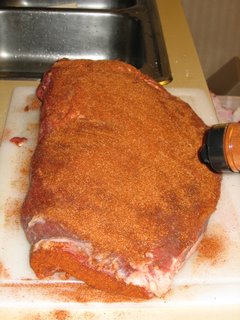
I was asked on a bbq forum yesterday to detail the step-by-step method I use for preparing bbq brisket. By no means am I the definitive authority on cooking brisket, nor are my steps for preparing and cooking brisket the exclusive or only way to do it, but they have served me well and my results in competition have improved using these steps consistently.
1. I start out with a Certified Angus Brisket (CAB for short) and trim the excess fat from the meat. At my local butcher these briskets average between 11 and 13 lbs. and cost between $35 - 40. If I buy two of them, I receive a 30% discount. The actual price of the briskets vary according to the going market price from week to week. I used to purchase the brisket "flats" at Sam's, which are more affordable, but I have found that my results with the flats do not equal the results I receive from the whole briskets.
2. I puncture the brisket with a sharp object like a fork or a Jaccard meat tenderizer prior to seasoning the brisket with my spice rub mixture.
3. Prior to applying the rub, I spray it with cooking spray. The cooking spray gives the rub something to help it adhere to the brisket.
4. Apply liberal amounts of my brisket rub on both sides of the meat.
5. Place the brisket in a plastic bag and let the brisket marinade overnight in the refrigerator.
6. Pre-heat my Weber Smokey Mountain (WSM for short) to about 190 degrees using lump charcoal. I've had good results with Royal Oak brand.
7. Put the brisket on to cook.
8. Maintain cooker temp as low as possible near 190 degrees for as long as possible. I've found that the slower I can cook the brisket, the more consistent my results are.
9. I foil the brisket after about 5 hours, or once the bark begins to form.
10. I spritz with apple juice a few times during the cooking process as well. This seems to help with bark formation.
11. I continue cooking until the brisket temperature reaches 192 degrees.
12. I let the brisket set in an Igloo cooler for 3 - 4 hours before slicing it up.
13. After slicing, I sauce with my favorite bbq sauce.
BBQ
Saturday, March 18, 2006
HomeBBQ.com Cooking Team
Kevin and wife Clara achieved an unbelieveable four -- 1st place category awards to go along with the overall grand championship.
Folks, that's never been done before in the history of the FBA: that's a 1st place chicken; 1st place ribs; 1st place pork; and 1st place brisket.
The performance is going to vault him to the head of the team of the year standings in the FBA ahead of Kick the Tire, Light the Fire, Florida Cracker, and last year's formidable runner-up in the FBA TOTY...Woodhouse Grill.
I started my competiton career cooking on Kevin's team and was on the team at Kevin's maiden voyage into competitition bbq at a KCBS event in Brooksville, FL. He was still using the Lang 84 at the time. It was so hot and so dry that we caught the grass on fire before we even started.
Since that time Kevin has qualified for the American Royal cook-off, qualified for the Jack Daniels cook-off, and is a 3-time FBA TOTY champion; and he's switched to pellet power from the ever-reliable Lang 84. It looks like Kevin has the pellet cooker figured out for sure.
Congratulations Kevin and Clara!
Read about my friend Rob's bbq competition efforts
"Original" BBQ Rub
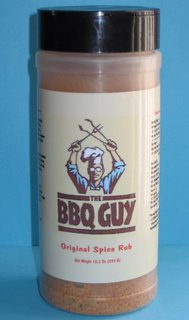
This award winning barbecue seasoning compliments anything barbecued. I have used this seasoning in competition with excellent results. This recipe is my own custom formulations that I use in KCBS and FBA bbq competitions.
The rub is available in 13 oz. shaker bottles for $7.00 (plus cost of shipping). Quantity discounts are available. Contact me to order bbq rub.
I am in search of distributors for my bbq products. It's the perfect opportunity for a competition barbecue team to earn extra income at contests selling our unique bbq spice rubs and sauces. If you would like to represent my unique line of products, please contact The BBQ Guy. Ask about special quantity discounts and how to qualify for free shipping. Wholesale inquiries are welcome.
Apple iPod Shuffle, 512Mb

I got a new gadget today that will be perfect for bbq contests: an Apple iPod.
I guess I'm moving into the technological age.
As I write this post I'm listening to some Johnny Cash songs I downloaded from iTunes on my iPod Shuffle I purchased at Sam's Club.
The Shuffle is the 512Mb iPod that holds 120 songs, has rechargeable batteries and an advertised 12-hour play time.
I'm listening to Johnny Cash songs that I downloaded:
Ring of Fire
Hurt
Folsom Prison Blues
I've Been Everywhere
I Walk the Line
Speaking of Johnny Cash, if you haven't seen Walk the Line, the multi-award winning and Oscar nominated movie documenting the life of Johnny and June Cash starring Joaquin Phoenix and Reese Witherspoon, I highly recommend you take a couple of hours and watch it.
Friday, March 17, 2006
Better BBQ Series: Day 6
The time has come to discuss bbq sauces.
The popular styles of making BBQ include Memphis-style (using a tomato based sweet sauce), Kansas City-style (thick and sweet tomato based sauce), Texas-style (spicy tomato based sauce) and North Carolina-style (vinegar with either pepper or catsup).
Of course there are many variations of all of the above.
I like mustard-type sauces that appear to be popular in South Carolina, but I've noticed they are not prevalent in many other areas.
For contests, it's been my experience that a sweet sauce will consistently outperform a sauce that has a little kick to it. Also, in cooking for friends, family, co-workers and clients, I've noticed that the closer to mainstream you stay with your bbq, the better it's received.
If the sauce is too spicy, you risk alienating folks that prefer sweet sauces; if it's too sweet, you risk alienating those that prefer spicy and on and on. A sweet sauce that is a little tangy versus very spicy (i.e. hot) seems to be a pretty good choice.
One option is to take your favorite sauce and tweak it a little bit by adding some brown sugar, honey, molasses, vinegar, or a combination of the above.
For starters you might want to experiment with K.C. Masterpiece or Kraft and add honey in various amounts until you reach a flavor and consistency that you like. You can do some "informal" taste tests with friends to help you gauge the appeal of your particular ratios of sweet versus hot versus tangy.
Or, you can choose from a variety of sauces sold by any number of bbq competitors and use them straight from the bottle if that fits the bill.
I've included a basic sauce recipe you can experiment with.
Basic BBQ Sauce
1/2 cup apple cider vinegar
3/4 cup ketchup
3 tablespoons packed dark brown sugar
1 tablespoon yellow mustard
1 1/2 tablespoon molasses
1 teaspoon salt
1 teaspoon black pepper
Here's some more information about bbq sauces found on the South Carolina Barbeque Association web site: South Carolina BBQ History
It's a pro-mustard bbq sauce article, but it will give you an idea about how passionate folks can be about their bbq sauce.
Click here to read the previous article in the series
BBQ
Tuesday, March 14, 2006
Michigan State BBQ Association
I think it's a great idea. It seems to be in the initial stages of discussion and exploration to gauge the level of interest, but there are a lot of barbecuers here in Michigan that I'm sure will support a barbecue association, if this comes to fruition.
If you're interested in the formation of a barbecue association in Michigan, check out the posts on the BBQ Forum, or shoot me an e-mail and I'll pass your inquiry along to the folks trying to get it organized.
Saturday, March 11, 2006
How to Make a BBQ Rub - Better BBQ Series, Day 5
There are plenty of commercial bbq rubs on the market. It's fun to experiment with them and try out different flavors and styles of rubs. Some are hot, some are sweet, some are salty and some have a near perfect blend of heat, sweat and salt; but, the best way to learn what tastes good to you is by learning to make your own bbq rub.
Making your own rub will teach you more about flavors and "blends" of flavors than buying someone else's idea of what they think tastes good. You may end up going back to the commercial rub eventually, but by experimenting with your own rub too, you'll learn what to look for in a commercial rub.
Let's begin be defining a bbq rub....
BBQ Rub = Mixture of spices that are combined are sprinkled or "rubbed" onto the meat before cooking. This could be a mixture as simple as equal parts of salt and pepper, or it could be something as complicated as a mixture of 10 -12 difference spices with subtle differences.
Here's a good basic rub that you can use to get started. After using it a few times you may find that you'd prefer a little more pepper, a little more sugar, or something else added, but this will give you a good base to start out.
Basic BBQ Rub Recipe
3 tablespoons of sea salt
3 tablespoons of granulated sugar
3 tablespoons of mild paprika
1 teaspoon of granulated garlic
1 teaspoon of granulated onion
1 teaspoon of black pepper
1 teaspoon of white pepper
Basic BBQ Rub # 2
1/2 cup paprika
1/4 cup ground black pepper
1/3 cup salt
1/3 cup sugar
2 tablespoons chili powder
2 tablespoons garlic powder
2 tablespoons onion powder
1 teaspoon cayenne
Some other optional items you may to experiment with by adding to or subtracting from this recipe from time to time include: nutmeg, oregano, cummin, cayenne pepper, chipotle powder.
I've found that cummin goes well with pork and oregano goes well with beef.
Apply this rub to the meat you're preparing to bbq and let it marinade in the refrigerator for 8 hours or more (overnight works well) prior to cooking. This will allow the rub to penetrate the meat better than if you apply it directly before placing in the smoker.
In my opinion, it's better if the rub is a little on the hot side when you mix it up because after cooking, rubs tend to lose a little of their heat, especially if you use foil during the cooking process.
Happy experimenting!
Clinton Riverboat Days KCBS BBQ Contest
Contestants will compete for $10,000 in prizes. The team that accumulates the most total points in the four professional categories--chicken, pork ribs, pork shoulder (or butt), and brisket--are eligible for the overall grand champion awards.
For more information, visit the Riverboat Days web site.
Directions
Friday, March 10, 2006
BBQ Contest Proposal -- Claims Cook-offs
Some contests that don't offer electricity or running water for competitors charge the same entry fees as contests that supply them for no additonal charge. Some contests charge the same entry fee to compete, but pay out less total prize money to winners than some others and still other contests charge higher fees and pay out less total prize money and to fewer competitors.
As a friend of mine used to say, "It is what it is." Granted, as bbq competitors we're probably lucky that organizers are still willing to organize bbq contests at all because it's likely that expenses for the organizers are also rising.
That has given me an idea for a way to reduce costs for competitors and add a little something "extra" to the bbq contest experience.
What if contest sanctioning bodies and organizers changed things a little bit and added a new feature to the mix--allow the cookers, grills, smokers, etc. use by the winning competitors to be "claimed" by any competitor that does not finish in the top 5 in the overall results.
In this manner, the overall expense for competitors would gradually decrease. This idea harkens back to "grass roots" auto racing, as many track owners and sactioning bodies allow losers to "claim" the winner's motor and sometimes even their entire car for say, $2,500-$3,000. This keeps cost down for everyone because the most you would want to spend is about $2,500 - $3,000 because if you win, you run the risk of losing your investment.
The bbq contest organizer or sanctioning body could allow the losers to purchase the cooker used by the winning team for a set fee, for example, $1,000. Over a period of time, this would bring costs for everyone down. New competition teams would not feel the pressure to constantly upgrade their equipment to "keep up with the bbq Joneses'" so to speak.
I'm not advocating making an across the board change for all bbq sanctioning bodies, but I do think it would be interesting to add this to the rules for a few contests here and there. Maybe it could be incorporated into the rules for the Backyard Division for starters.
Who knows, with a little luck maybe bbq will someday have it's own version of the popular SpeedTV program-- Pinks!
Another article about bbq contests
Peace, Love and Barbecue
Wednesday, March 08, 2006
Swamp Boys BBQ
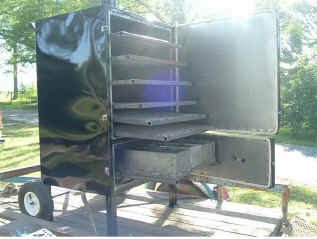
Rob, who is affectionately known as "Rub" to his friends on the barbecue contest circuit and on various bbq forums and discussions boards, has a web site that details his barbecue efforts and it contains a large collection of bbq contest banners from professional barbecue competitors from all over the country.

Here's a nice offset bbq pit that Rub built and cooked on in route to winning the Backyard division at the Tiger Town 8th Annual Lakeland Pig Fest bbq contest in Lakeland, FL in Jan. 2004. This fine looking 5 foot cooker was built on a sailboat trailer. The trailer has plenty of wood storage underneath and a cage for hauling miscellaneous supplies on the front end.
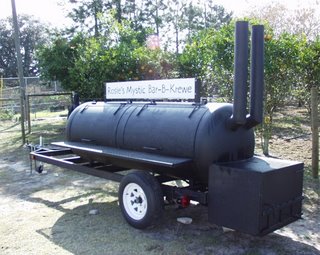
Here's another offset smoker that Rub helped build from the ground up. This smoker measures 10 feet and was used primarily for fundraising efforts. The cooker will cook 32 pork butts at the same time and has been sold to a lucky new owner.
Pig on the Pond - FBA BBQ Contest
For those who live in Florida, here's a map to event.
I competed in the event a couple years ago and it's one of the best bbq contests I've ever attended. The organizer paid through 7th place instead of the publicized 5th place in each category, because she had collected extra money towards prizes. This is unusual for a bbq contest, and most assuredly is one of the big reasons this contest is supported so well by competitors.
Other contest organizers could learn a lot by visiting this contest, or by talking to the organizer, Cheryl Fishel, to share ideas.
Tuesday, March 07, 2006
BBQ Food Safety - Day 4, Better BBQ Series
The link above provides some basic guidelines published by the FDA that should help you understand the basics of food safety. There are too many positive things encompassing the overall bbq experience to allow something as preventable as illness resulting from the lack of food safety precautions to "rain on your parade". Please take a few minutes and become familar with the guidelines. Your guests will thank you for it.
Here are some of the highlights:
- Keep food chilled below 40 degrees in the refrigerator or in an ice cooler prior to cooking.
- Chill cooked food (leftovers) back down to 40 degrees ASAP.
- Do not let food sit out unrefrigerated for more than 2 hours.
- If marinading meat prior to cooking, do it in the refrigerator.
- When thawing meat, it's best done in the refrigerator (thawing at room temperature increases risk and is not advised).
Read the previous article in the series.
Sunday, March 05, 2006
Barbecue Test Kitchen - Spare Ribs
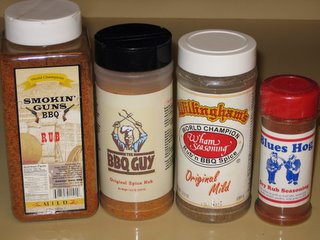
Today, I'm conducting a taste-test for a variety of spice rubs that are used on pork ribs. From left to right: Smoking Guns BBQ Rub "Mild", The BBQ Guy's "Original" Rub, Willingham's World Championship "Original Mild", and Blues Hog "Dry Rub" Seasoning.
I've tried them all individually from time-to-time, but I've never conducted a comprehensive test and tested them side-by-side....until today.
I'll be using them just as I would use them in competition...liberally. And to make this test as "scientific" as possible, I'm cooking a fifth rack seasoned generically with plain old garlic powder, onion powder and a liberal coating of brown sugar. This rack will serve as my "control" for the experiment.
In the interest of fairness, I'm also going to use the same barbecue sauce on all the ribs so I can better gauge the pro's and con's of the actual rub. I'm cooking them in my Weber Smokey Mountain (WSM) and using Royal Oak lump charcoal.
Here's a few pictures of the prepartion process.
St. Louis-style pork spare rib with cut, trimmed and ready for seasoning (front side).
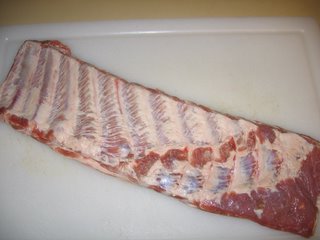
St. Louis-style pork spare rib with back-flap and membrane removed (back side).
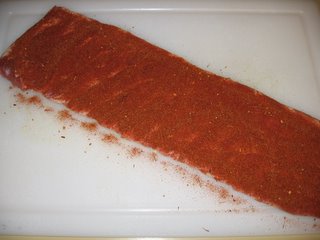
Seasoned with Blues Hog "Dry Rub" this rack of ribs is ready to be placed back in the referigerator to marinade for several hours prior to cooking.
Some folks I know allow their ribs to set out at room temperature for an hour or so before placing back in the referigerator. The theory is that the pores of the meat "open" a little more and allow the seasoning to penetrate deeper into the meat. Although this may occur, I still prefer to keep the meat refrigerated until just prior to cooking in the interest of food safety. I think it's best to maintain meat temperature at or below 40 degrees as the health department advises.
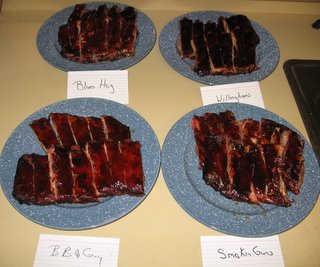
Here's what I ended up with 6 hours later. I separate each type of rib into it's own stack and labeled them so we could compare the pro's and con's of each type. Guess what we determined? They're all good!
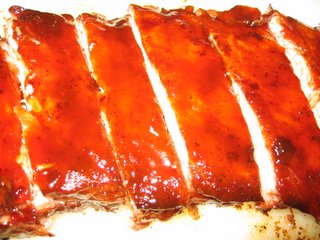
I actually liked Blues Hog and The BBQ Guy spice rub the best, but the Willingham's was good too. The Smokin' Guns was a touch too salty for my personal tastes, but was pretty good.
Read about last week's cook--Beef Brisket
BBQ Contest Alternatives
If everyone were using the same type and quality of meat (whether high or low quality), it would offer a more balanced approach to the competition. The contest results would be focused more upon who the good cook's really are versus who has a better source for meat and who is willing or able to spend a lot of extra money for the best chicken, beef, and pork.
In this manner all competitors would come to the event with empty coolers. This would allow the bbq contest organizers to do a more thorough job of inspecting the coolers and would thwart attempts to circumvent the rules. Under the current system, all of the coolers in a cook team's contest site are not always inspected and there is opportunity for the unscrupulous to bring "extra" meat that might not comply with the spirit of the rules.
Competitors would draw #'s for their meat and it could be distributed at the cook team's meeting. Meat preparation would be conducted in plain view and not behind closed doors of an RV, camper or cook team trailer. In this manner, the meat preparation would take place following the cook's meeting and the contests reps ability to police the preparation would improve. This would also add an extra element of intrigue for spectators. Since the meat preparation would be happening concurrently, spectators would be better able to see what's going on.
Another idea for consideration....
Put the competitors in a centralized area with a controlled entry and exit point. Bring the competitors and cooking equipment into the centralized cooking area and any coolers, cookers, boxes, etc. coming in or out of the area would be subject to inspection.
Saturday, March 04, 2006
Zoo B Que - KCBS Barbecue Contest
Scheduled for July 29, the entry fee is $200 which includes entry into all of the traditional KCBS meat categories: chicken, pork ribs, pork shoulder or butt, and brisket. To register for the event, or to obtain more information, contact Marsha at Lakeshorestudio@sbcglobal.net, or the Racine Zoo at (262) 636-9273, or via e-mail at skratochvil@racinezoo.org
It sounds like a good time. TheBBQGuy.com Cooking Team might have to make room for this contest on our planned events this year.
Friday, March 03, 2006
BBQ Books - Day 3, Better BBQ Series
Barbecue books are an excellent source of ideas for barbecue recipes, smoking techiniques, bbq sauces, bbq spice rubs, as well as some interesting bbq history information.
Reading books about bbq allow you to learn from others mistakes and leverage their insight and experience to help reduce your learning curve. All of the books discussed below have valuable nuggets of wisdom. The authors have more than 100-years of cumulative bbq experience between them.
Here's a list of some of my favorites:
John Willingham's World Championship Bar-B-Q
I received John Willingham's book as a gift and have read it cover to cover. It's packed full of bbq secrets from the greatest bbq contest cook to ever put on an apron. Willingham details basic cooking methods including what wood to use and what wood not to use, temperatures to cook at, and he provides his personal recipes. I especially like the rib recipe and his recipe for pork shoulder. These recipes can be used as written, or you can tweak them slightly to suit your personal taste. The recipes alone would be worth the price of the book.
Willingham is a bbq restauranteur, author, inventor and historian. His innovative "Turbo Cooker" has won many barbecue awards.
Dr. BBQ's Big-Time Barbecue Cookbook
The book contains a lot of common sense barbecue information that enthusiasts and those new to low and slow cooking can use to improve their barbecue ability. There are tons of recipes and a lot of nice stories and other tid bits to keep your interest. Mr. Lampe's results on the professional barbecue circuit speak for themselves.
Visit Dr. BBQ's home on the world wide web.
Slow Smoked Success
Lee Bentch takes the reader through his process from novice to expert on his quest to learn to cook mouth watering bbq and shares his experiences. He is a knowledgeable bbq cook with an entertaining wit. Lee's experience in the corporate world helps relate bbq to business and offers cautionary insight for wannabe bbq restauranteurs. Whether you are a back yard chef, or you make a living cooking for others, this book is worth reading. It will make you laugh, it will make you think, but most of all, it will remind you some things about bbq you may have forgotten.
Learn more about the author, Lee Bentch.
These others are on my list to read soon:
Ribstars Backyard Smoking and BBQ Cookbook
Dr. BBQ's Barbecue All Year Long Cookbook
Where There's Smoke There's Flavor
Backyard BBQ
Stay tuned for the next installment.
Read the previous article in the series.
Thursday, March 02, 2006
Better BBQ - Day 2
As you embark on your own personal barbecue journey, it will pay huge dividends if you take 30-minutes and ponder on your short, medium and long-term goals for your bbq effort. Making a few mental notes, or better yet writing them down, will serve you well in your quest.
Why are goals important?
Goals are kind of like a road map. They will serve as your own personal compass and road atlas to help you navigate your way throught the highs and lows of your journey. Setting some goals will help you identify and quantify your level of commitment, both personal and financial, to your bbq endeavors. Just like in life, there is no free lunch in bbq either.
Here's some quick thought starters to help get you going....
1) Do you want to learn to cook bbq for your own personal enjoyment and for family and friends, or are your goals oriented more toward the personal chef, catering for small and large groups, or do you think you want to become a a restaurant owner/operator?
2) Have you seen a bbq program featured on the Food Network, thought it was interesting and want to try to create your own pulled pork, slow-smoked brisket, or chicken so moist it almost melts in your mouth?
3) Will this be a weekend endeavor, or a full-time occupation?
4) Are you exploring the idea of competing in bbq contests, or will this be a backyard hobby?
5) Do you have experience cooking bbq already?
6) Are you ready to take your efforts to the next level?
Learning to cook good bbq requires devotion, practice, and a reasonable level of commitment...in varying degrees. Depending on your answers above, some professional training may be in order.
For example, if you want to turn bbq into a business, your first order of business should be a visit with the local health department office, or at the very least a phone call and quick perusal of their web site if your county offices provide this information online.
If your interests are focused on competing, your considerations should include time spent talking to others who compete, talking to judges, or becoming a member of a bbq association. Volunteering to assist another experienced team for a few contests is also a worthwhile possibility to consider.
Once you've identified some of these things, you will be better prepared to proceed with the wonderful world of barbecue. You can skip this step, but if your serious, I urge you to spend some time weighing these questions and forumlating your own answers before you invest a lot of time and money into barbecue. In this way you'll spend your energy more effectively and you won't be dissapointed later.
As another example, after you've invested heavily in equipment to start your new catering business, it would be disheartening to find out from the health department that you must operate from a "certified" or "commercial" kitchen, which may or may not be cost prohibitive.
And yet another example, imagine how you'd feel after you purchase a new $20,000 offset smoker and have it delivered only to discover that you'll have to purchase a new vehicle with enough towing capacity to transport it to bbq contests.
If there are readers who have experienced any of these situations and want to share some words of wisdom for the benefit of the group, your coments are welcome.
Read the previous post in the series.
Wednesday, March 01, 2006
Featured Smoker - New Braunfels
In response to my post from yesterday, Day 1 in a series of articles I have planned titled "31-Days to Better BBQ", I received this picture of "Bessie" from Adam Byrd, webmaster at Men In Aprons.
This New Braunfels is a perfect example of an offset smoker. Inexpensive, but very effective, Adam says this smoker turns out some good barbecue. He regularly cooks all types of 'que ranging from brisket, ribs, pork loin, chickens, Thanksgiving Turkey and plenty of other items. Adam has even customized the handles using spindles normally used in stairway construction.
If you'd like to share a picture of your smoker with my readers, e-mail me and I'll post it here.
